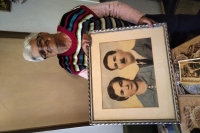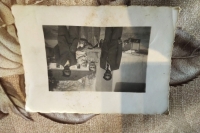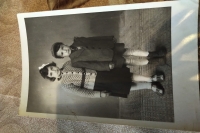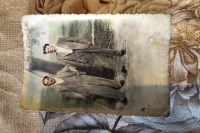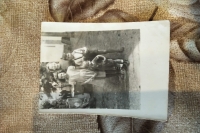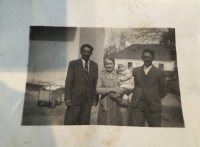Daughter of a shoemaker whose livelihood was taken away, relatives expelled to Hungary

Download image
Alžbeta Balážová, born Csölleyová, comes from a shoemaker and peasant family. Her father’s name was Gyula Csölley and he came from the village of Baka near Dunajská Streda. Alžbeta was born during World War II, on October 23, 1940. At that time, Baka belonged to the Kingdom of Hungary after the first Vienna Arbitration. Alžbeta ‘s father trained as a shoemaker with his father Rudolf. They were quite successful, as in 1937 they bought the house from a local Jew. They set up a workshop in it and lived there. Her mother Janka, born Fekete, lived in the village of Jurová and came from a peasant family. Her parents had about six to seven acres of fields they lost in collectivization in the 1950s. The witness survived the war as a child in Baka without a father, who was at the front. After the war, her uncle Feri (as he was called at home) Bacsi’s family, moved to Hungary because he was a farmer and his father-in-law owned land. After the war, all Hungarian schools in Slovakia were abolished, so Alžbeta attended the first four years only in the Slovak class. She started attending a Hungarian school in her fifth year. After graduating from elementary school in Gabčíkovo in 1954, Alžbeta started going to work because her parents did not have enough money to send her to study. She became a seamstress in the shoe production cooperative in Dunajská Streda, despite the fact that she had not studied to be a shoemaker. She also worked as a controller for the plant in Gottwaldov (today’s Zlín), where she worked for ten years until she got married. Then she took care of the children and later also of her husband when he fell ill. In 1959 she undertook a medical course. They built a hospital in nearby Dunajská Streda, where she started working part-time and eventually remained working in the kitchen. The revolutionary events of 1956 in Hungary, when people rebelled against the communist regime, were also perceived by the Hungarians in Baka. Alžbeta remembers how the pastor canceled the Mass on the day of its outbreak. At the time of the invasion of Czechoslovakia in 1968, the witness’s family had a pig-slaughter feast in the family. She wasn’t afraid there would be a war, but she remembers that one tank crashed into her friend’s house. Her husband, who was a party member (a member of the Communist Party) and began to criticize the invasion, was expelled from the party. She has been retired and living in her native village of Baka for more than twenty years.
